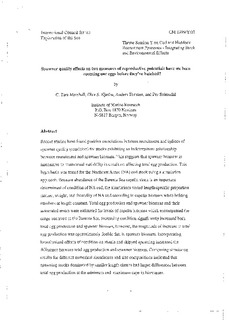Spawner quality effects on two measures of reproductive potential: have we been counting our eggs before they've hatched?
Abstract
Recent studies have found positive associations between recruitment and indices of
spawner quality (condition) for stocks exhibiting an indeterminate relationship
between recruitment and spawner biomass. This suggests that spawner biomass is
insensitive to interannual variability in condition affecting total egg production. This
hypothesis was tested for the Northeast Arctic (NA) cod stock using a simulation
approach. Because abundance of the Barents Sea capelin stock is an important
determinant of condition of NA cod, the simulations varied length-specific proportion
mature, weight, and fecundity of NA cod according to capelin biomass while holding
numbers at length constant. Total egg production and spawner biomass and their
associated errors were estimated for levels of capelin biomass which encompassed the
range observed in the Barents Sea. Increasing condition significantly increased both
total egg production and spawner biomass, however, the magnitude of increase in total
egg production was approximately double that in spawner biomass. Incorporating
hypothesized effects of condition on atresia and skipped spawning increased the
difference between total egg production and spawner biomass. Comparing sim~~lation
results for different numerical abundances and size compositions indicated that
spawning stocks dominated by smaller length classes had larger differences between
total egg production at the minimum and maximum capelin biomasses.
Publisher
ICESSeries
ICES CM documents1999/Y:07
